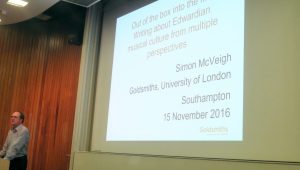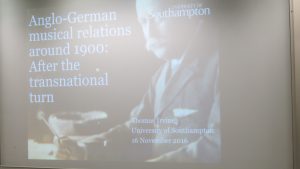The future of digital musicology – Hartley Residency
 By Anna Kent-Muller, PhD candidate. We were delighted to have Professor Simon McVeigh, from Goldsmiths, University of London, to join us for our first Hartley Residency of the 2016-17 academic year. On the 15th-16th November Simon shared with us his work on concert life, with specific emphasis on his collaborative project ‘In Concert’. As this was my first Hartley Residency, I was interested to see how this eminent researcher’s work could influence my knowledge and perception of digital archiving, and I especially looked forward to the second day’s round table discussion on ‘Big Data, Small Data and the Challenges for Musicology’.
By Anna Kent-Muller, PhD candidate. We were delighted to have Professor Simon McVeigh, from Goldsmiths, University of London, to join us for our first Hartley Residency of the 2016-17 academic year. On the 15th-16th November Simon shared with us his work on concert life, with specific emphasis on his collaborative project ‘In Concert’. As this was my first Hartley Residency, I was interested to see how this eminent researcher’s work could influence my knowledge and perception of digital archiving, and I especially looked forward to the second day’s round table discussion on ‘Big Data, Small Data and the Challenges for Musicology’.
 Tuesday began with a postgraduate seminar, focused around a set of readings on digital archiving and interdisciplinarity – as well as introducing the ideas and concepts which would be prominent in Simon’s keynote. Particular emphasis was placed on Simon’s current project on Edwardian recitals, interrogating what it means for someone to study concert life in the digital age. Discussions in the seminar resonated around Simon’s collaborative project ‘In Concert’. This project aims to develop a set of new standards for curation – through taking a ‘fresh’ approach to building a digital archive. This new approach included discussions of how to document such a large range and quantity of sources, including through crowd funding. We discussed how crowd funding would aid speed of digitization, but add an element of potential risk of quality and consistency.
Tuesday began with a postgraduate seminar, focused around a set of readings on digital archiving and interdisciplinarity – as well as introducing the ideas and concepts which would be prominent in Simon’s keynote. Particular emphasis was placed on Simon’s current project on Edwardian recitals, interrogating what it means for someone to study concert life in the digital age. Discussions in the seminar resonated around Simon’s collaborative project ‘In Concert’. This project aims to develop a set of new standards for curation – through taking a ‘fresh’ approach to building a digital archive. This new approach included discussions of how to document such a large range and quantity of sources, including through crowd funding. We discussed how crowd funding would aid speed of digitization, but add an element of potential risk of quality and consistency.

For me, the most interesting insights came from the use of digital methods in the ‘In Concert’ programme. Through a bottom-up approach, a richer picture of the diversity of music making across London was created. In Simon’s presentation, we were shown a variety of visualisations to show how the places of concert making in the eighteenth and nineteenth century changed. In our seminar, I highlighted how by making this data digital the project is enabling us to combine data through semantic web methods. This shows how open data could enable us to compare our new knowledge of music making in the eighteenth and nineteenth century to other data such as maps, the population distribution at the time, and economic wealth of individuals across the city.
Simon McVeigh’s keynote, titled ‘Out of the Box into the Fire: Writing about Edwardian Musical Culture from Multiple Perspectives’, took us on a journey from his early collection of concert data, the ‘Calendar of London Concerts’, through to his recent, and on-going project ‘In Concert’. Interestingly, the end of his presentation introduced ideas of using hypertext fiction in the creation of his next book. He discussed the use of datasets behind a ‘book’ that would enable you to travel through the space in a variety of threads – enabling both a breadth of story and individual narratives to be explored in Edwardian musical culture. This part of his talk led to great discussions between the audience and Simon. Popular hypertext fiction concepts such as ‘getting lost in hyperspace’ were debated. However, overall the emphasis was placed on the development and utilisation of the Web in a movement from the scholarly multi-chapter monograph to a ‘reader perspective’ text.
 In tradition of the Hartley Residency, the second day starts with a presentation from a researcher in our department. This talk by Thomas Irvine, on ‘Anglo-German musical relations around 1900: After the transnational turn’, started with the question of whether nationalism haunts British music history. Through examining the work of Hubert Parry, Tom discussed how the music we perceive as ‘British’ has large influence from German, other European and oriental musical cultures. He explored how the transnational and global turns in history have cast doubt on the utility of national frameworks in understanding music of the Edwardian period.
In tradition of the Hartley Residency, the second day starts with a presentation from a researcher in our department. This talk by Thomas Irvine, on ‘Anglo-German musical relations around 1900: After the transnational turn’, started with the question of whether nationalism haunts British music history. Through examining the work of Hubert Parry, Tom discussed how the music we perceive as ‘British’ has large influence from German, other European and oriental musical cultures. He explored how the transnational and global turns in history have cast doubt on the utility of national frameworks in understanding music of the Edwardian period.
To finish off the residency, a stimulating debate was established around Simon’s paper ‘Big Data, Small Data and the Challenges for Musicology’. Here resident lecturers David Bretherton, Richard Polfeman and Mark Everist provided responses to Simon’s paper. The discussion was framed around how we present musicology and how we do musicology. For me, some of the most interesting insights came from these discussions. David Bretherton raised how big data has changed the way we think about sonata theory. His example highlighted how periphery music such as concertos frequently do not adhere to standard ‘sonata theory’ form, and Beethoven – whom most of these theories are based on – was an exception to the rule, not the norm. Richard Polfreman introduced the concept of ‘graveyards of data’ and how we are stuck with a large amount of our data being non-digital. Therefore we should look at making sure our future data is digital, open and useable for everyone – incorporating ideas of the semantic web. He highlighted that we should possibly look at the future first, and then crowd source to digitize our graveyards of data.
The concepts that resonated with me involved ideas of how can we impact the future. We must look at how we do work now, and what we do to make sure our data is reusable – enabling it as open, and in standardized formats. The concept of making sure my dissertation was encoded in TEI, or the music I work with encoded in MEI, any databases I collect being published openly using semantic web standards – these are all ways in which I could create sustainable and re–usable data for future musicologists to utilise and engage with. Academia is moving from the solitary researcher, to the combined community to build and develop the interdisciplinary network of researchers.

